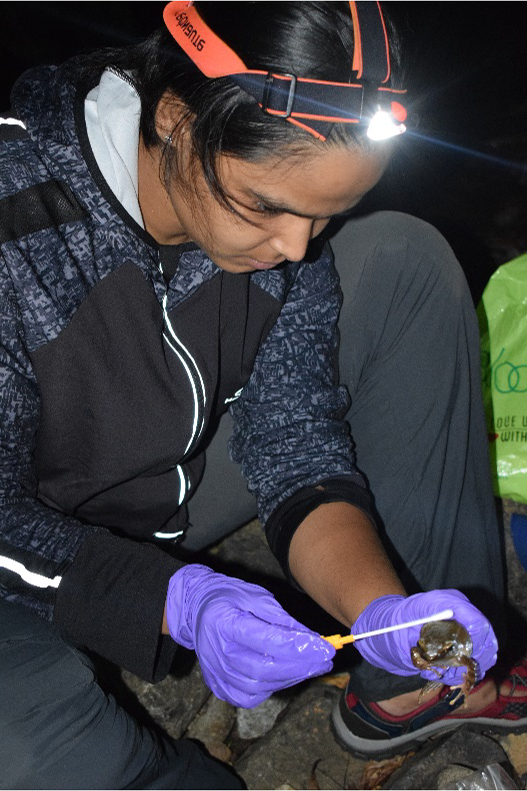Researchers from CSIR-Centre for Cellular and Molecular Biology (CCMB), India in collaboration with researchers in Australia and Panama have established a new test for successful diagnosis of Chytridiomycosis in amphibians. Chytridiomycosis is an infectious disease in amphibians caused by two fungal pathogens: Batrachochytrium dendrobatidis (Bd) and Batrachochytrium salamandrivorans (Bsal). It has driven more than 90 amphibian species to extinction globally. Due to the unprecedented loss of amphibian diversity it has caused, the disease is referred to as the driver of ‘amphibian apocalypse’, and its status is being closed monitored globally.

Gayathri Sreedharan from CCMB swabbing a frog to collect Bd fungal samples
The researchers have developed and validated a new marker for the disease, and has been now published in the journal Transboundary and Emerging Diseases. The team consisting of Ph.D. scholars, researchers and scientists from Centre for Cellular and Molecular Biology, Bangalore University, Padmaja Naidu Zoological Park, Ashoka University, in India; University of New South Wales, James Cook University, in Australia; Smithsonian Tropical Research Institute, in Panama, have tested the new marker on several amphibian species including frogs, toads, caecilians (limbless amphibians) and salamanders (tailed amphibians). The study reported 70% amphibians with Chytridiomycosis infection; an almost 8 times higher prevalence than the previous reports from India.
Surveillance and monitoring must be effective in order to track infection in amphibian populations, especially in regions where Bd fungus has become enzootic ie., where the pathogen is restricted and does not cause death. “Our previous work on Bd fungus in India had shown that existing diagnostic assays are not sensitive. A universal, sensitive, specific, repeatable, and affordable diagnostic test is, thus, required to perform surveillance of Chytridiomycosis in an efficient manner. Our new diagnostic test works well in India, Australia and Panama. Its efficiency is comparable to the gold-standard test recommended for Chytridiomycosis. The new test can promote widespread efficient surveillance of chytridiomycosis in different parts of the world, and it might lead to new insights into the pathway transmission and infection,” said Dr Karthikeyan Vasudevan, the lead scientist from CCMB in the study.


